
Recently on Cyclingnews.com |
An interview with Mary McConneloug, August 21, 2008
Keeping the balance
Mary McConneloug (Kenda / Seven) is one of two women representing the United States in the cross country mountain bike race at the Olympic Games in Beijing. After finishing ninth at the Olympics in Athens, Greece, McConneloug has spent the past four years travelling the globe with her partner Michael Broderick. Cyclingnews' Sue George caught up with McConneloug to discuss her preparations for the big day in China.
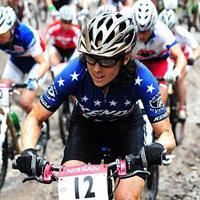
|
"It's all about balance," said McConneloug of what has been a hectic year leading up to the Olympics.
She and Broderick have spent most of their time on the road, training and travelling to races, first to perform well enough internationally to make the cut for the US Olympic Long Team last winter, and then to all the spring European World Cups and the World Championships to make the final Olympic team.
The two, who rented an RV and travelled all over Europe, faced the daily challenge of staying healthy and fit on the road while also coordinating their logistics.
"I was doing my yoga everyday. I was eating well, sleeping well and training well and those are the biggest priorities. It was intense," said McConneloug of the focus her nomadic, pre-Olympic life required. "I've learned to deal with stress over the past few years and keep my priorities straight.
"We've been really living in the moment. It's been so busy the last four months of my life.
"What I've learned is that to stay calm in stressful situations is going to help more than getting stressed out. All those World Cups in Europe, supporting ourselves and Mike and I not having someone tell us when to be and where…was hard.
"We had to feed ourselves and do all the travel in between. We had to look at it as a fun adventure. It's interesting … attitude is everything. You have to have a good attitude about everything you're doing and not get down about it - see it as an opportunity."
That attitude could be just what it takes to win a medal in Beijing.
The road to selection
McConneloug attended the spring World Cups and placed consistently well enough to find herself racing on average as the second best American behind Georgia Gould. Based on their performances, Gould and McConneloug seemed to be the obvious choices to fill the two US Olympic team spots, but when the initial mountain bike team selections were announced, only Gould was named.
"I don't think of this as my last Olympics. 40 is the new 30 and you're not done at 40. As long as I keep doing my yoga and love it, who knows?-Mary McConneloug notices the top female MTBers aren't getting any younger |
That brought back the nightmare of the 2004 US team Olympic selections when the battle for the single nomination between McConneloug and Sue Haywood ended up in arbitration. The selection process was confusing and differing interpretations of which races counted in the final points tally gave different outcomes as to which rider should go to Athens. In the end, McConneloug was named to the team.
"The selection process (for the mountain bike team) this time was very fair," said McConneloug. "It was laid out way in advance and we all knew where we needed to be racing and what we needed to do. USA Cycling did a fantastic job of outlining the procedures and we had very similar selection criteria as the other countries."
The problem this time was that a rider from another cycling discipline was contesting not being included on the Olympic team. Since the second women's mountain bike team slot was discretionary, McConneloug's spot could have gone to the protesting rider instead.
"There was an arbitration going on. It was a stressful time because they could have taken the discretionary spot for the mountain bike if they felt she was to be awarded," said McConneloug, who prevailed in the end. "It was a very stressful week. I was on the phone with lawyers. That was supposed to be my rest week."
Coming into form
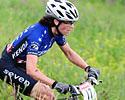
|
McConneloug went into the US National Mountain Bike Championships relieved to have made the team, but fatigued from the mental toll taken to get there. But that didn't stop her from repeating her national cross country title win in Mount Snow, Vermont. She triumphed in a showdown with Gould.
"I came into the race not really knowing how I would do just because I'd been training for Beijing, putting in heavy hours the previous weeks before. I'd been thinking forward to having a peak in late August. So I'd planned to rest all week. We had a nice place to stay and rest. I got some bodywork. I was feeling good."
She went into the race with her eye on Gould and cyclo-cross star Katie Compton. "She's come from the back before and killed us all in cyclo-cross, so I was wondering what was going to happen here."
Gould and Compton set a blistering pace from the gun, but in the end it was Gould and McConneloug trading turns at the front. In a sort of role reversal, McConneloug, who has always been a skilled technical rider and descender, found herself outclimbing Gould, but struggling to hang with her on the descents.
'We were never more than 15 or 20 seconds apart. I was passing her on the climbs and she was gapping me on the descents," said McConneloug, who went on to explain her different riding style.
"This year, I've been riding World Cup courses pretty much and there's nothing as technical as Mt. Snow on the World Cups. Also, I was a little cautious going into the downhill because it had rained so heavy the night before. I was thinking I don't want to slip up and if I go down, it would cost me big. I was definitely taking a conservative approach early in the race."
On the final descent, she realized she needed to throw caution to the wind if she wanted to keep her title, so she did just that and went for it. "I thought to myself, 'If I want to win this jersey again, I need to just let it go.'"
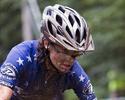
|
When McConneloug cramped on the final small climb just before the end of her race, a potential win looked to be in jeopardy. "I was so ready to give everything my body had that day. I was just dancing up the climbs and I could hear a close friend cheering me on."
"The cramping is something Mike deals with in his racing sometime and he tells me how he just pushes through - he is so mentally strong. So I thought of Mike and said 'I'm pushing through these cramps' and so I stood up and it was unbelievable to push even harder and then they went away," she said of her surprise at the time. "'That's strange,' I told myself, and they didn't come back until I went over the finish line."
McConneloug narrowly won the final sprint to the line. "Maybe Gould was geared down one gear too small? That's what I read somewhere," said McConneloug, but she noted that sprint workouts were one of her favourite workouts.
"It just feels so good to make the power come on short order," she said. "Because of it, I think I have a really strong start. People see me and I'm tiny and they don't expect I'll have that power."
That power could come in handy in Beijing where the course is said by some to favour power riders. "I hear it's all a man-made course a total power course. There are steep climbs and that's good."
Olympic day
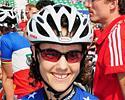
|
"I feel like my fitness is just coming on now," said McConneloug at the Mont-Sainte-Anne World Cup, where she finished sixth, in the middle of a heavy training block. "For the spring World Cups, I wasn't in top, top form and everyone else was it seems. Now I have that mental feeling."
McConneloug went on to race the next weekend at the Bromont World Cup. The challenging, wet and muddy conditions had her running many sections and taking a cautious approach.
"I didn't want to take any risks and go down right now. It's an important time."
She knew she had to get on a plane the next day and start her travels to California and South Korea, where she would finish off her pre-Olympic training before heading to Beijing four days before the big day.
The women's Olympic race will differ from a World Cup in terms of field size. "In the Olympics, there are only 30 women racing so it's a tiny field. I know from Athens that it just feels different - more nationalistic - you go, you represent your country and you know who all the fastest are - the same as always."
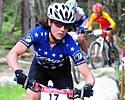
|
"It's really about having a lucky day. Conditions could really take a toll."
Reflecting on her ninth place in Athens, McConneloug said, "My race there was all right. I didn't have a perfect race. I made a few mistakes and if you make a mistake there, it costs you. You're back a few seconds and then you're gapped off and you're blocked off from moving forward. Everyone's so motivated."
No matter what the outcome, McConneloug is appreciative of her second Olympic chance. "I'm so grateful to have the support to get to this place in my life. I can't believe that Mike and I pulled this off once again.
"I'm going to go and do my best. I'm going to go there in top fitness and really enjoy it. It's an amazing opportunity. It's not just about the race. It's about being a representative for my country, my sponsors and my family and just loving it and appreciating it."
What's next?
Some might expect the 37 year-old McConneloug to be planning her post-Olympic retirement, but that is not the case.
"I don't think of this as my last Olympics. You never know. 40 is the new 30 and you're not done at 40."
"As long as I keep doing my yoga and love it, who knows? I think there are no rules here about how old you can be if someone can take care of themselves and be really smart about how they race and when they race."
In the shorter term, McConneloug will likely skip the Australian World Cup due to the expense of getting there and back, but she may contest the Cactus Cup in mid-September.
But at least for the next day or two anyway, all of her thoughts will be on the Olympics.
Read the Cyclingnews' diaries of Mary McConneloug and Michael Broderick.
